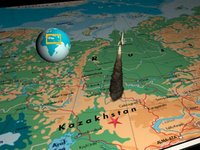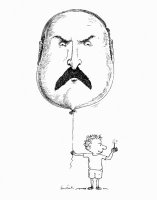 A spectre is haunting Eurasia - the spectre of Gerontocracy. All the Powers of new Europe are deserting a divided Union to shy away from this spectre: Bruxelles and Rome, Merkel and Blair, French anti-globalists and German Federalists.
A spectre is haunting Eurasia - the spectre of Gerontocracy. All the Powers of new Europe are deserting a divided Union to shy away from this spectre: Bruxelles and Rome, Merkel and Blair, French anti-globalists and German Federalists.The new Great Game over Central Asia between Russia and the West is becoming a struggle to either raise or exorcise the ghosts of gerontocratic systems. Russia's sphere of vital interests in the near abroad can only be preserved by control over infrastructure, and above all the flows of energy from the region. This is achieved by catering to the needs of a gerontocratic and corrupt system, originating from the soviet heritage, which Moscow has left the states of Central Asia with.
The West, to the contrary, has a vested interest in exploiting regional resources of oil and gas, and produce safe passages for receiving them. For long, the West was pragmatic in its approach to authoritarian regimes in the region, in order to reach the overarching goal of access to the coveted energy resources. Now, the realisation that it is impossible to work with corrupt and Machiavellian regimes is starting to dawn.
The summit between presidents of Russia, Kazakhstan and Turkmenistan in May was bad news for the European Union and the United States. Presidents Nazarbayev of Kazakhstan and Berdymukhammedov of Turkmenistan spoke in favour of closer energy relations with Russia, and against developing the
 westward trans-Caspian gas project. As previously reported, the trans-Caspian gas project is the key to long-term profits for the Western alternative of transferring gas from Central Asia - the Baku-Tbilisi-Ceyhan pipeline (BTC). Among BTC-investors are British Petroleum (BP) and American Chevron. Also, Royal Dutch Shell is about to lose its controlling stake in the Russian Far East Sakhalin-2 project, and BP is in trouble with its investment in the Siberian Kovykta gas field.
westward trans-Caspian gas project. As previously reported, the trans-Caspian gas project is the key to long-term profits for the Western alternative of transferring gas from Central Asia - the Baku-Tbilisi-Ceyhan pipeline (BTC). Among BTC-investors are British Petroleum (BP) and American Chevron. Also, Royal Dutch Shell is about to lose its controlling stake in the Russian Far East Sakhalin-2 project, and BP is in trouble with its investment in the Siberian Kovykta gas field.Western energy companies are certainly experiencing heavy setbacks in the FSU these days. As there is little to do as concerns Russia, the importance of Central Asian resources increase. Still, there is the question of the gerontocrat ghost - the inability to deal with the corrupt regimes of Central Asia. Then, what is companies such as BP and Shell going to do? Well, as the old movie tune goes:
If there's somethin' strange in your neighborhood
Who ya gonna call - ghostbusters!
If it's somethin' weird an it don't look good
Who ya gonna call - ghostbusters!
So, who might be such a ghostbuster? Who are the energy moguls going to call to exorcise the spectre - get rid of the ghosts of gerontocracy? A qualified guess might be a traveller in political revolutions, with experience of dealing with the old post-communist foe. Who then would be a better candidate than former US Ambassador Richard Miles? That ambassador Miles  was posted to Serbia before the overthrow of Milosevic, and to Georgia during the Rose revolution is, by many, regarded as no coincidence. Some even claim that Miles figured in the outskirts of Ukraine's Orange revolution. After retirement in 2005, ambassador Miles worked as Executive Director of the Open World Leadership Center - headed by James "Icon & the Axe" Billington. Now, it seems, Richard Miles is a man without a mission. So, why not take pity on this old man and turn to him for advice - even give him a job? Miles might just be the ghostbuster who - with a little help from his friends - could get rid of some of Central Asia's gerontocrat ghosts. Who would be more fit to bring democracy and market economy to Central Asia and, in the process, safeguard western energy interests in the region?
was posted to Serbia before the overthrow of Milosevic, and to Georgia during the Rose revolution is, by many, regarded as no coincidence. Some even claim that Miles figured in the outskirts of Ukraine's Orange revolution. After retirement in 2005, ambassador Miles worked as Executive Director of the Open World Leadership Center - headed by James "Icon & the Axe" Billington. Now, it seems, Richard Miles is a man without a mission. So, why not take pity on this old man and turn to him for advice - even give him a job? Miles might just be the ghostbuster who - with a little help from his friends - could get rid of some of Central Asia's gerontocrat ghosts. Who would be more fit to bring democracy and market economy to Central Asia and, in the process, safeguard western energy interests in the region?
 was posted to Serbia before the overthrow of Milosevic, and to Georgia during the Rose revolution is, by many, regarded as no coincidence. Some even claim that Miles figured in the outskirts of Ukraine's Orange revolution. After retirement in 2005, ambassador Miles worked as Executive Director of the Open World Leadership Center - headed by James "Icon & the Axe" Billington. Now, it seems, Richard Miles is a man without a mission. So, why not take pity on this old man and turn to him for advice - even give him a job? Miles might just be the ghostbuster who - with a little help from his friends - could get rid of some of Central Asia's gerontocrat ghosts. Who would be more fit to bring democracy and market economy to Central Asia and, in the process, safeguard western energy interests in the region?
was posted to Serbia before the overthrow of Milosevic, and to Georgia during the Rose revolution is, by many, regarded as no coincidence. Some even claim that Miles figured in the outskirts of Ukraine's Orange revolution. After retirement in 2005, ambassador Miles worked as Executive Director of the Open World Leadership Center - headed by James "Icon & the Axe" Billington. Now, it seems, Richard Miles is a man without a mission. So, why not take pity on this old man and turn to him for advice - even give him a job? Miles might just be the ghostbuster who - with a little help from his friends - could get rid of some of Central Asia's gerontocrat ghosts. Who would be more fit to bring democracy and market economy to Central Asia and, in the process, safeguard western energy interests in the region?









